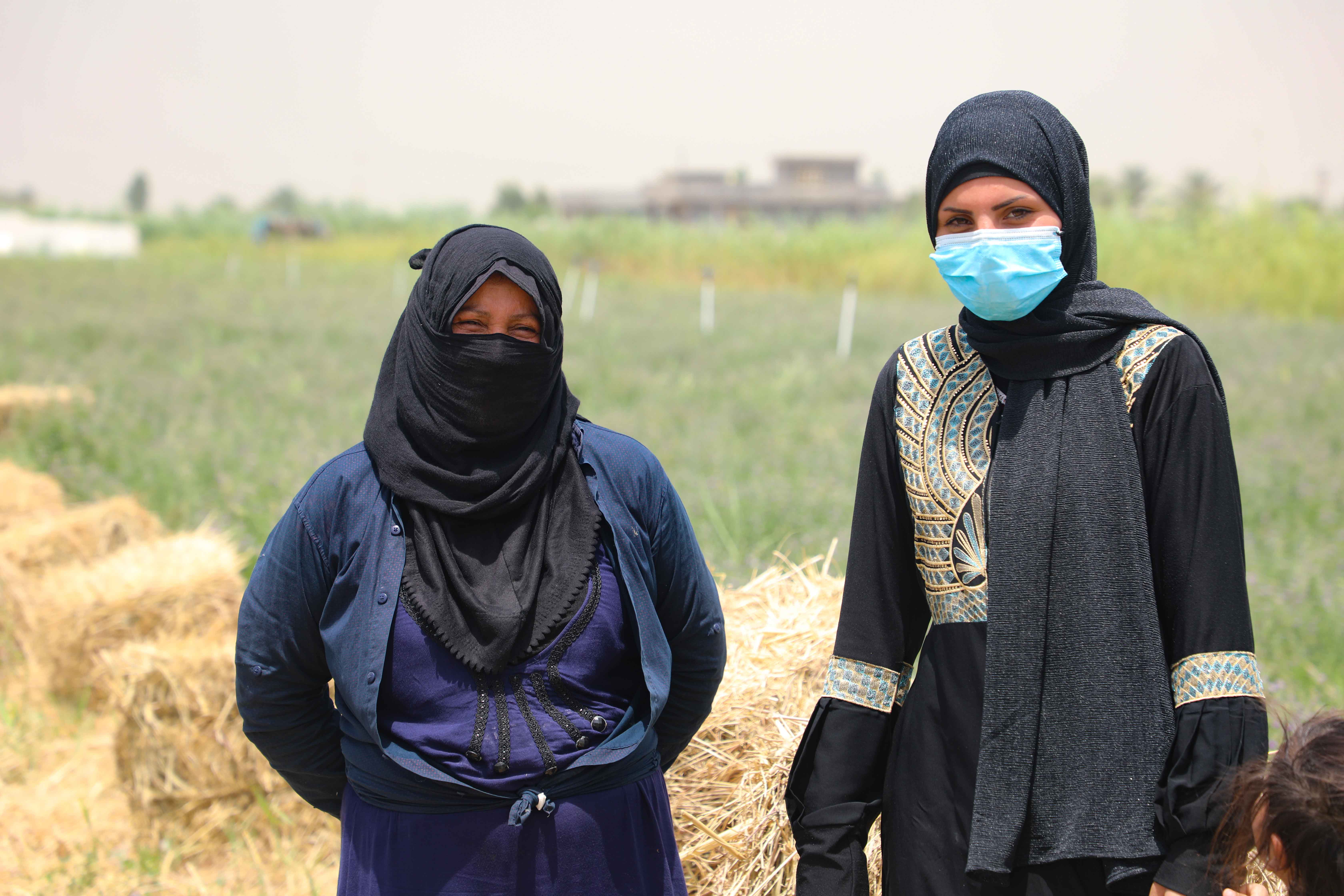A story of an Iraqi farming family’s resilience after tragedy
Fatima and Her Sons: A Story of Patience, Perseverance, and New Beginnings
June 25, 2024

Bringing Life Back to the Land, with hope in her eyes, Fatima sows seeds for a brighter future.
An inheritance passed on from generation to generation.
The connection of Iraqis to their land is deep – it is in their DNA. For many rural families in the country, agriculture further underscores the deep connection between farmers and the land they cultivate. The heroes of our story hail from a farming family, where farming was passed down through generations. The children grew up alongside their parents and grandparents, who were custodians of the land, and learned traditional techniques for improving the quality of the soil, harvesting crops, and preserving the environment.
Fatima, is a strong-willed female farmer, who lived in a small, ruralvillage in Diyala province, with her husband and two sons. In Diyala, the family led a simple, peaceful, and “picture perfect” existence , as their days were filled with working their land, raising animals, and enjoying the beauty of farm life in the rural plains of Iraq.

A dark storm threatens their dream life.
The arrival of ISIL shattered their picturesque existence. As a storm suddenly darkens the blue skies, ISIL was the dark storm that destroyed everything in their path. This storm took no prisoners, they killed those who resisted and fought for their lives and land, creating orphans and ruining families. Fatima's husband did not weather this storm, as he was killed in the ISIL massacre, making Fatima a young widow with young children to raise, alone.
Grief and loss overwhelmed her, but Fatima refused to give up. Her husband’s words rang in her ears, giving her strength, "The land is our mother, it is our source of livelihood, and we must protect and preserve her."
Fatima rose, took her sons and dried their tears, together they began re-cultivating their land in Diyala.
“My husband is in this land. His blood, sweat and tears, are part of it. Tilling the soil of this fertile land was our way of honoring him and being with him still,” said Fatima.
Their land was always fertile, producing an abundance of crops, sustaining communities for centuries and contributing to trade.

Huge challenges and a growing hope.
Fatima and her sons faced a lot of challenges. They encountered pitying glances from some of their neighbors and attempts to exploit them by others. Yet, they faced every adversity with courage and determination. Fatima faced a shortage of agricultural tools and machinery, rising prices, difficulty obtaining loans, climate change, and drought. But thanks to their perseverance and determination, they were able to overcome these challenges.

A grant revives the farm.
Through the United Nations Development programme in Iraq, by livelihood projects, Fatima and her sons secured a financial grant, that allowed them to restart work on their land. As their worked the land, it began to yield once again, producing animal feed that she and her sons sold to nearby farms to feed livestock, where a bundle (heap) costs 2,000 Iraqi dinars. The family grows alfalfa sprouts, and as the cultivation of this crop extends throughout the year, it generates good income for them. Today, life on the farm improves daily. Fatima’s children are now men, and she relies on them heavily. Together, as a family, they are cultivating their land and rebuilding their dreams.


"Our harvest depends on the availability of water. With the increasing severity of droughts, we know that we need to manage water more efficiently, so we have introduced drip irrigation to our land to ensure that it is irrigated continuously. The grant also helped us purchase a pump to draw water and distribute it through drip irrigation." Fatima’s son, Younis says.
"My sons and I complement each other, each of us have our own tasks on this land. We have been farmers for generations, and this is a legacy my husband and I passed onto them, and one that they are now passing onto their children,” Fatima explains.
Fatima's sons contribute to the farming, harvesting, and even marketing of their product with their families. They have also been able to start growing some crops through greenhouse farming.

Generations Growing Together, Fatima, a pillar of strength, inspires her grandson as they cultivate the land.
Rising from the ashes.
Today, Fatima and her family have become a symbol of hope. The story of a strong female farmer and her sons, who, against all odds, triumphed over every challenge they faced because they never lost sight of hope. They are an inspiration to all, and their story teaches us how strong will anddetermination can overcome injustice and that life can begin, again.

About:
For many years, farmers like Fatima's family have relied on traditional farming and irrigation methods. Farmers typically take water by pumps to irrigate their farms, a challenging and water-intensive process that has become more difficult and expensive as water levels have declined across Iraq.
Therefore, the United Nations Development programme in Iraq, by livelihood projects supports modern irrigation methods, providing training courses and financial grants to enable them to adopt sustainable and modern agricultural practices to support farmers in Iraq and encourage them to adapt to climate change. Farmers learn about crop diversification, crop rotation, soil management, water conservation, drought-resistant techniques, value chain analysis, and business management, which enhances farm productivity and secures their livelihoods for years to come.
The project was implemented by the United Nations Development programme in partnership with Welthungerhilfe (WHH) and funded by the Japanese government.

 Locations
Locations